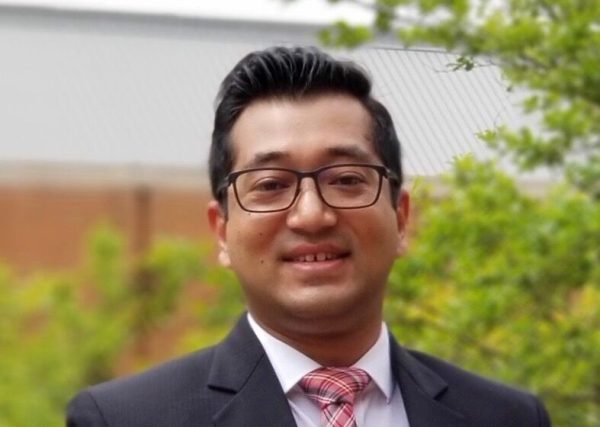Master’s Candidate Earns CDC Fellowship

UNC Charlotte Health Informatics Master’s candidate, Saugat Karki, M.D., has been selected for the Centers for Disease Control and Prevention’s (CDC) prestigious Public Health Informatics Fellowship Program (PHIFP). The PHIFP is a two-year training program for doctoral- or masters-level professionals, applying computer science and information technology to solve complex health problems.
Fellows in this program help the CDC investigate and solve complex public health informatics challenges, applying expertise in information science, computer science, and information technology to address current and future informatics needs.
With over 500 applicants and only 4-5 fellowship positions, the CDC PHIFP fellows represent the best and brightest minds who have shown potential and talent beyond the academic classroom. “Our Health Informatics Master’s candidate, Saugat Karki, MD, not only met the CDC’s stringent criteria, but he represents the very essence of what we stand for at UNC Charlotte, said Josh Hertel, Director of the Data Science Initiative. “Saugut is one of our many international students who came to UNC Charlotte with the desire and commitment to build and strengthen communities through his natural ability to connect people with ideas and resources.”
Dr. Karki was born and raised in Nepal and studied in India for over ten years. He then attended medical school in China and served as a physician for three years. In 2015 when the massive earthquake struck Nepal and left 6,000 dead and over 13,000 injured, Dr. Karki immediately traveled to the capital city of Kathmandu to help in the survival efforts. He soon discovered that many of the injured could not be served in Kathmandu, as they were trapped in a mountainous region some six hours away. With the assistance of the Red Cross and the added public awareness led by Amelia Hillary, the grand-daughter of renowned climber Sir Edmund Hillary, Dr. Karki was able to team with local volunteers, comprised of tour guides, trail builders, and the local climbing community to reach those who needed medical attention and basic supplies.
Dr. Karki said, “Nepal has no data on a good day. So imagine what happens in a natural disaster when you have no statistics on the injured, dead, the resources needed, or the logistics required to meet those in need.” It was here when he found himself not just serving as a doctor, but responsible for gathering, verifying, and mapping out the local population, injuries, food, supplies and road access. Through these efforts, his passion for healthcare spread into data science — and how data could be applied in healthcare settings for improved outcomes.
“Being selected for the PHIFP is a tremendous honor for me,” says Dr. Karki. “In terms of who is understanding the valuable connection between data and science to advance healthcare, nobody is better at this than the CDC.” During Dr. Karki’s fellowship at the CDC he will be working at the National Center for HIV/AIDS, Viral Hepatitis, STD, and TB Prevention. The team will work towards advancing Electric Case Reporting of STD by utilizing cloud strategies and an STD Data Repository which contains legacy as well as current STD data.
Congratulations, Dr. Karki. The CCI family is proud to be playing a role in your continued success.
For more News, Notes and Updates, Follow CCI on Twitter @UNCC_CCI